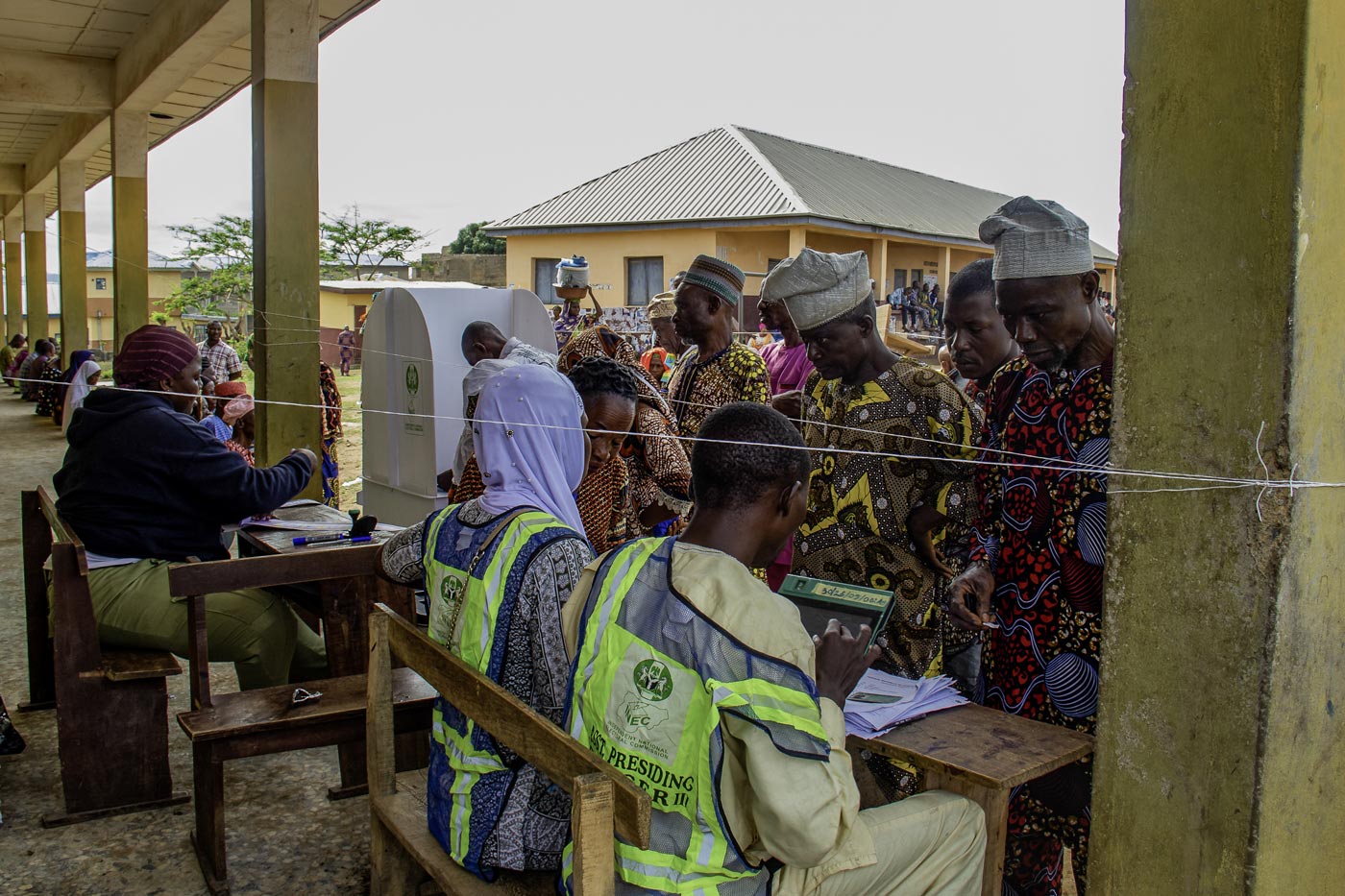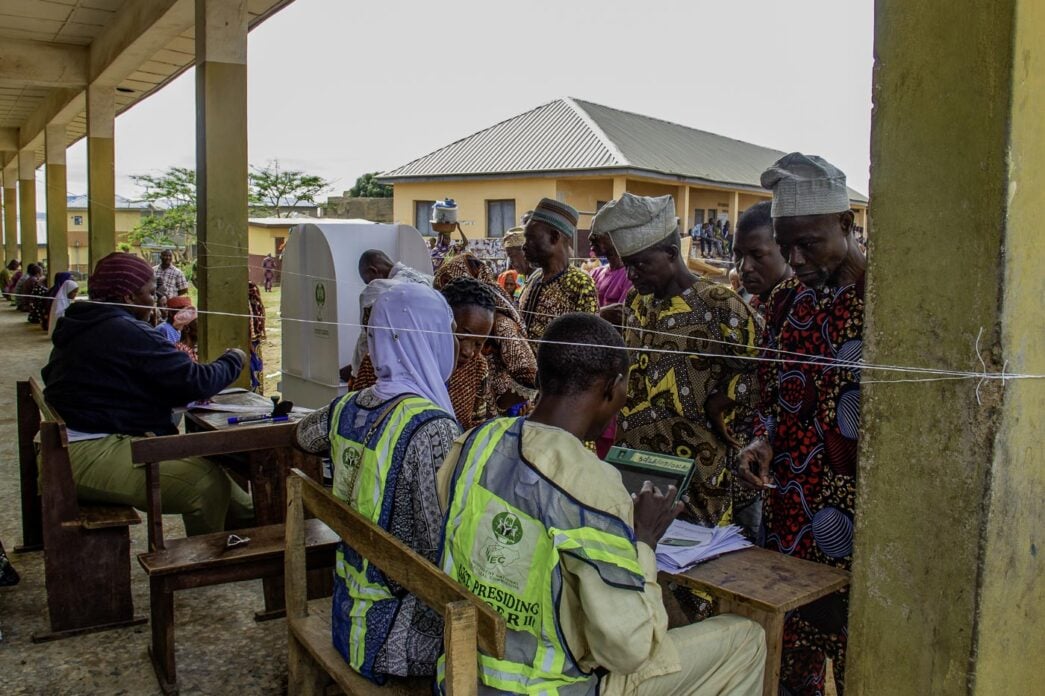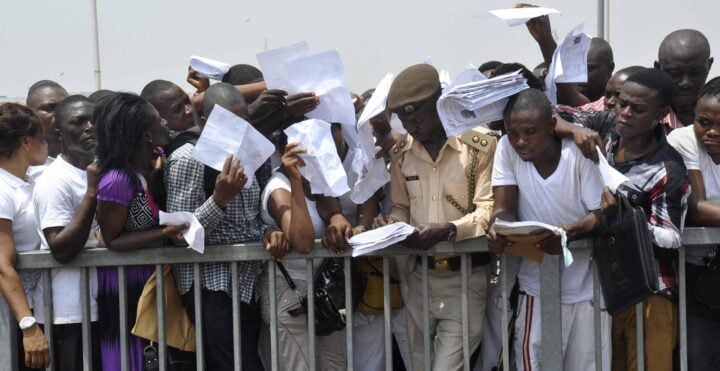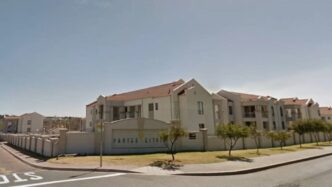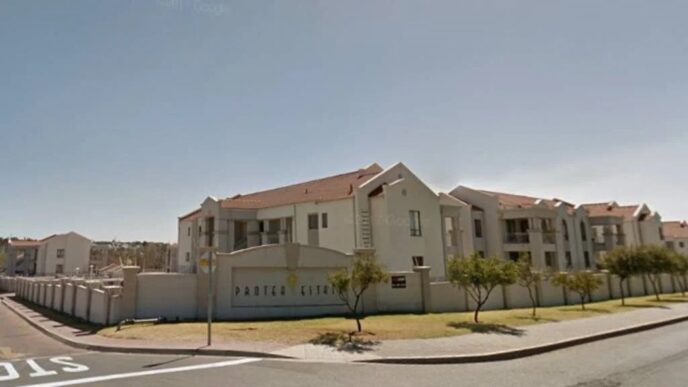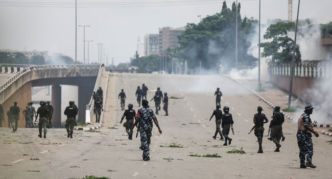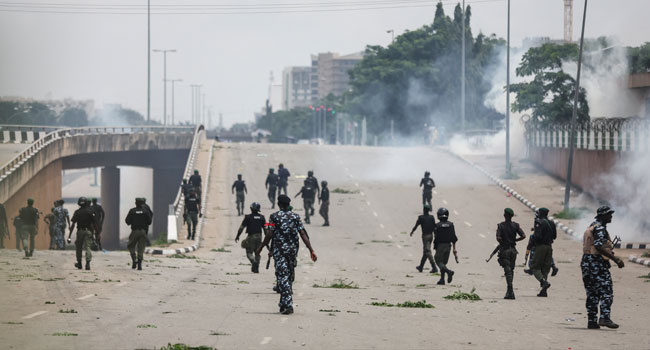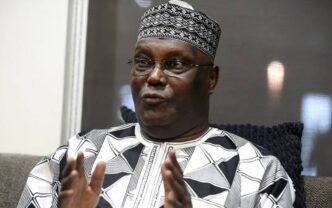An Independent National Electoral Commission (INEC) officer uses a Bimodal Voter Accreditation System (BVAS) machine during the general election in Ibadan, Oyo State February 25, 2023.
Photograph by Ayo Adams/CCIJ
BY HARUNA MOHAMMED SALISU, SAMAD UTHMAN, IDRIS KAMAL, LAMI SADIQ, AMINU ADAMU NAGANYE, USMAN BELLO BALARABE, ARINZE CHIJIOKE, OGECHUKWU VICTORIA UJAM, LUKMAN ABOLADE
When Nigerian election officials tabulated ballots during last year’s presidential election in the southern metropolis of Port Harcourt, something unusual happened: They began crossing out votes for certain political parties.
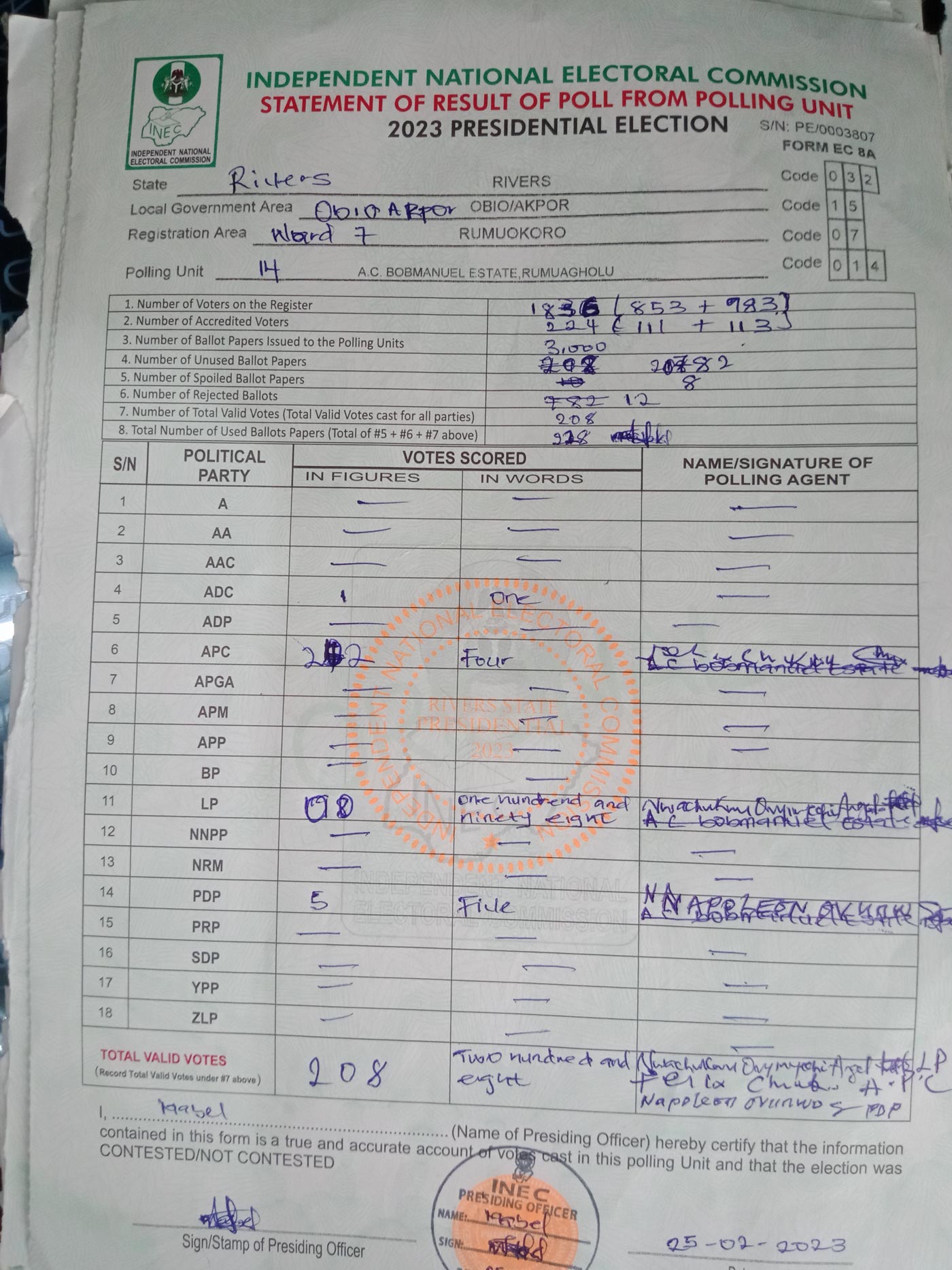
Officials for at least five polling sites in Port Harcourt’s Obio-Akpor LGA, a swath of roughly half a million people in the capital of Rivers state, took pen to paper and eliminated hundreds of votes before uploading tally sheets to the Independent National Electoral Commission’s computer system.
Take, for instance, this filing by a polling unit in Ward 7, in Obio-Akpor, an area with low-rise homes and apartments, businesses and churches.
Election officials on February 25, 2023, submitted a certified statement that 208 people voted in that day’s presidential election.
Advertisement
On the surface, the document shows the All Progressives Congress (APC) won almost all the votes, with 202 ballots in its favour.
But looking closer, notice the 202 appears to be written over another number. In the next column, poll workers are supposed to write the number in words.
It shows APC got only four votes. And a closer examination of the digits shows 202 was written over the number four.
Advertisement
Meanwhile, several rows down, the Labour Party (LP) is shown getting 00 votes, an unusual way to write down that it did not get any votes compared with how the rest of the document was filled out.
And for LP, when you check how many votes it got in words, the number is much different – “one hundred and ninety eight.” If words mattered, LP easily won the election in the community that day. But using the altered digits, APC pulled ahead.
For at least five polling sites in Obio-Akpor, a similar pattern emerged: Results were seemingly hastily overwritten, reversing votes for LP in favor of APC, which went on to win the presidential election.
The Centre for Collaborative Investigative Journalism (CCIJ) conducted an independent examination of thousands of polling station documents.
Advertisement
These documents are public records collected by Nigeria’s election oversight agency, the INEC. Each polling station in Nigeria is required to submit vote tallies that are then tabulated to determine election winners.
At least 20 other documents showed signs of vote totals being overwritten in Rivers state and elsewhere. Almost 4,000 were improperly submitted across the country without the signatures of poll supervisors — a requirement to ensure the validity of the filings, and 13,000 were submitted without proper stamps required to certify results. Separately, more than 14,000 that were uploaded to INEC are too blurry to read.
INEC declined repeatedly to answer questions about polling stations that appear to be altered or were missing required signatures by polling workers. It also declined to answer questions about illegible documents, blurry vote tallies and accounts of undertrained election workers.
Presented with CCIJ’s findings, Chibuike Mgbeahuruike, an election consultant for the Centre for Democracy and Development (CDD), said these should be investigated by INEC since they raise concerns about the integrity of Nigeria’s presidential election.
Advertisement
Altered election documents like the one from Port Harcourt “could indicate an attempt to manipulate the election results and undermine the trust in the electoral outcome, which have far-reaching implications for the country’s democracy,” according to Mgbeahuruike.
CDD is a Lagos-based NGO that advocates for improved democratisation in Nigeria and all of Africa. Mgbeahuruike said unstamped and unsigned voting tallies may raise further doubts about the credibility of the 2023 presidential election.
Advertisement
At the heart of the blurry and unreadable filings is the Chinese-manufactured computer system that was intended to ensure accuracy and transparency in Nigeria’s elections. The bimodal voter accreditation system – better known by its acronym, BVAS – made by Shenzhen Emperor Technology Co Ltd. INEC promoted the system as “critical to the 2023 general election.”

But polling workers at thousands of polling stations, apparently, struggled with the technology. Some complained that poor internet connections rendered the machines useless. Others had difficulty uploading the official statements of polling results, rendering documents blurry. Some workers complained that not everyone was trained properly, leading to mistakes and confusion.
Advertisement
The handheld computer tablets were designed to scan documents like polling results and send them to INEC. For the most part, this worked.
But instead of uploading polling results, a couple dozen polling workers uploaded photos of themselves.
Advertisement

Some uploaded images of luxury goods, including one picture of a Chanel watch. Someone even uploaded a physics homework assignment calculating levers, gravity and maintaining equilibrium.
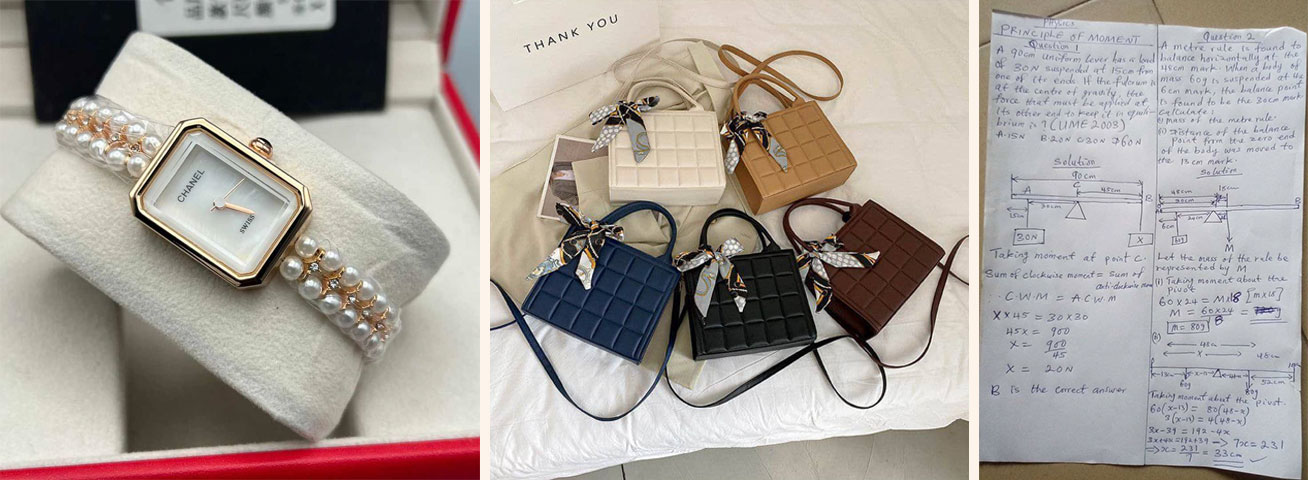
INEC declined to answer questions about how seemingly unrelated images were entered into the vote collection system.
Shenzhen Emperor Technology did not respond to repeated requests for comment at its offices in Abuja as well as in China.
WAS VOTING FIXED?
Irregularities like these happened across Nigeria. But perhaps no place is better for understanding the concerns these raise over voting outcomes than in the Niger Delta’s Rivers state.
In Port Harcourt’s Obio-Akpor section, Michael O. Amadi, then vice-president of Eliogbolo Youth Movement, told CCIJ inside his office at Eliogbolo town hall, “We declared that everybody in Eliogbolo and other polling units in Rumuokoro (Ward 7), Rivers State will vote for Bola Ahmed Tinubu, candidate of the All-Progressives Congress, (APC) as president of Nigeria.”
That was the ward with the apparently altered voting tally that awarded 202 votes to APC and none to LP.
“We are happy that they declared him president,” he said.
Amadi said the choice to vote for Tinubu was influenced by the former Rivers state governor, Nyesom Wike.
“Wike did well as a governor, so whatever he tells us, we should believe him,” Amadi said. “We also saw what Tinubu did while he was governor of Lagos state,” he said. “We believed in his capacity.”
But contrary to Amadi’s claim, several residents who voted at the town hall told the CCIJ that the LP – not Tinubu’s APC – won massively across different polling units.
“The Labour Party scored over 280 votes at the Town Hall,” said Ihunda Chimele, a resident of Eliogbolo. “We all voted for the party across many polling units. The support was massive. We were singing his name.”
The document uploaded to INEC’s computers suggests that much of that account may be true.
In Obio-Akpor, at Eliogbolo community town hall Rumuokoro, polling unit 32, the typing correction fluid tippex or white-out was used to alter vote totals for the three leading parties.
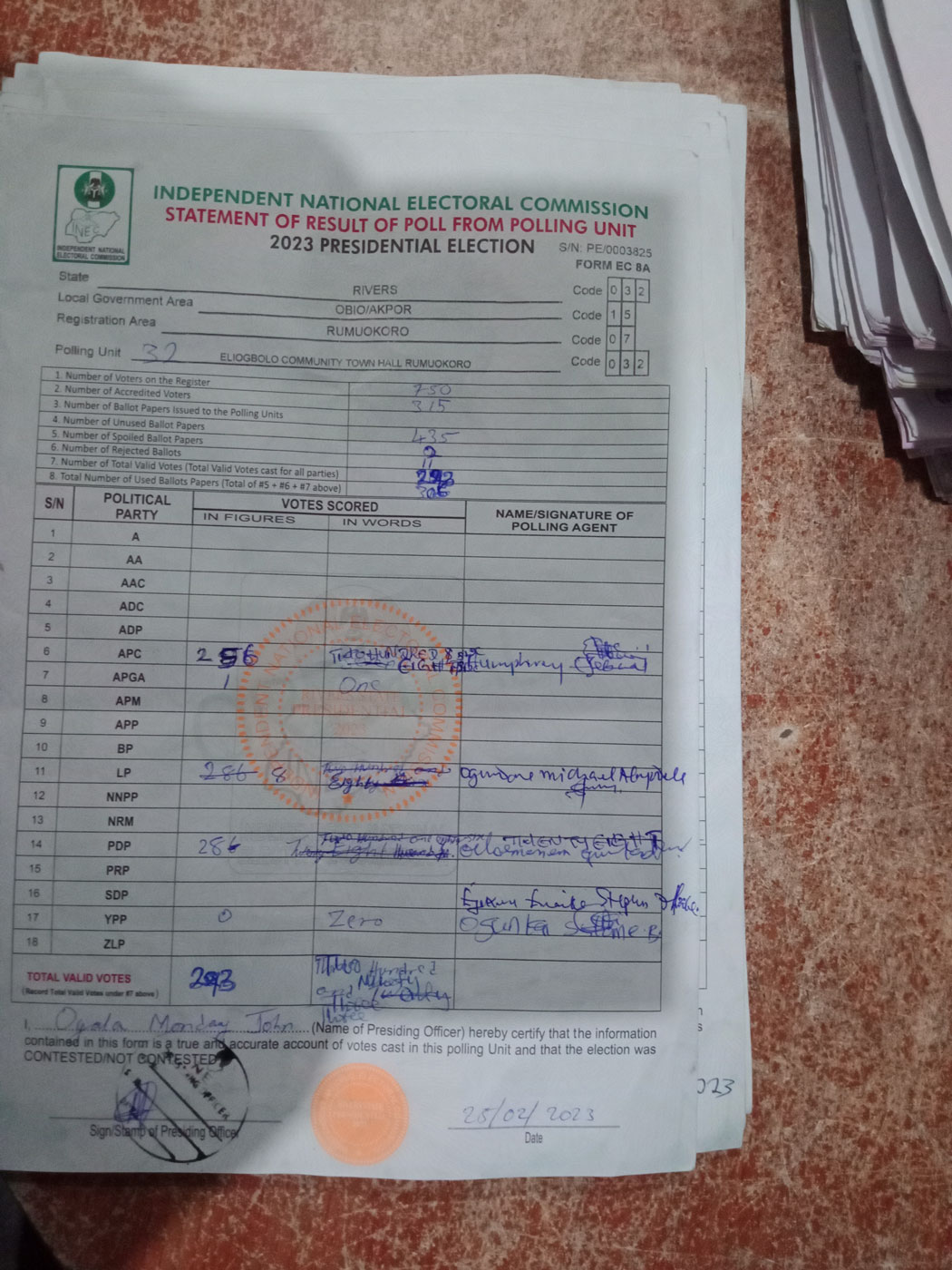
The vote totals for LP were crossed out and plummeted from 286 to eight. PDP appears to go down from more than 200 votes to 28. It appears more votes were added to APC, moving it from third place to winning the location.
Lambert Ihunda, a community leader for the PDP, who claims he went to polling stations to monitor the election, said LP’s candidate Peter Obi got more votes in the area.
“Even the blind knows,” said Ihunda. “Everybody wanted him to win the election.”
Uchechukwu Okonkwo, a resident of Elioparanwo, was on site while the voting process was ongoing at an open space next to Elioparanwon Road in Rumueme. He said the majority of voters favoured LP.
However, he said youths attempted to snatch away the ballot box when they saw the LP was winning. People resisted them until the youths returned with police officers and took the ballot box away.
“It was rigged in favor of the APC; both supporters of the PDP and the APC worked together during the election,” he said.
Records show a polling station there turned in results with numbers altered. New numbers appear to be in a lighter ink than the pen first used for writing down the votes.
These changes appear to alter who won the polling unit. APC soared from two votes to 146. LP tumbled from 39 votes to one.
Elsewhere in Obio-Akpor at Rumuokoro’s Ezinwho hall, the tally sheet from Rukpakwulusi polling unit 4 showed different kinds of irregularities.
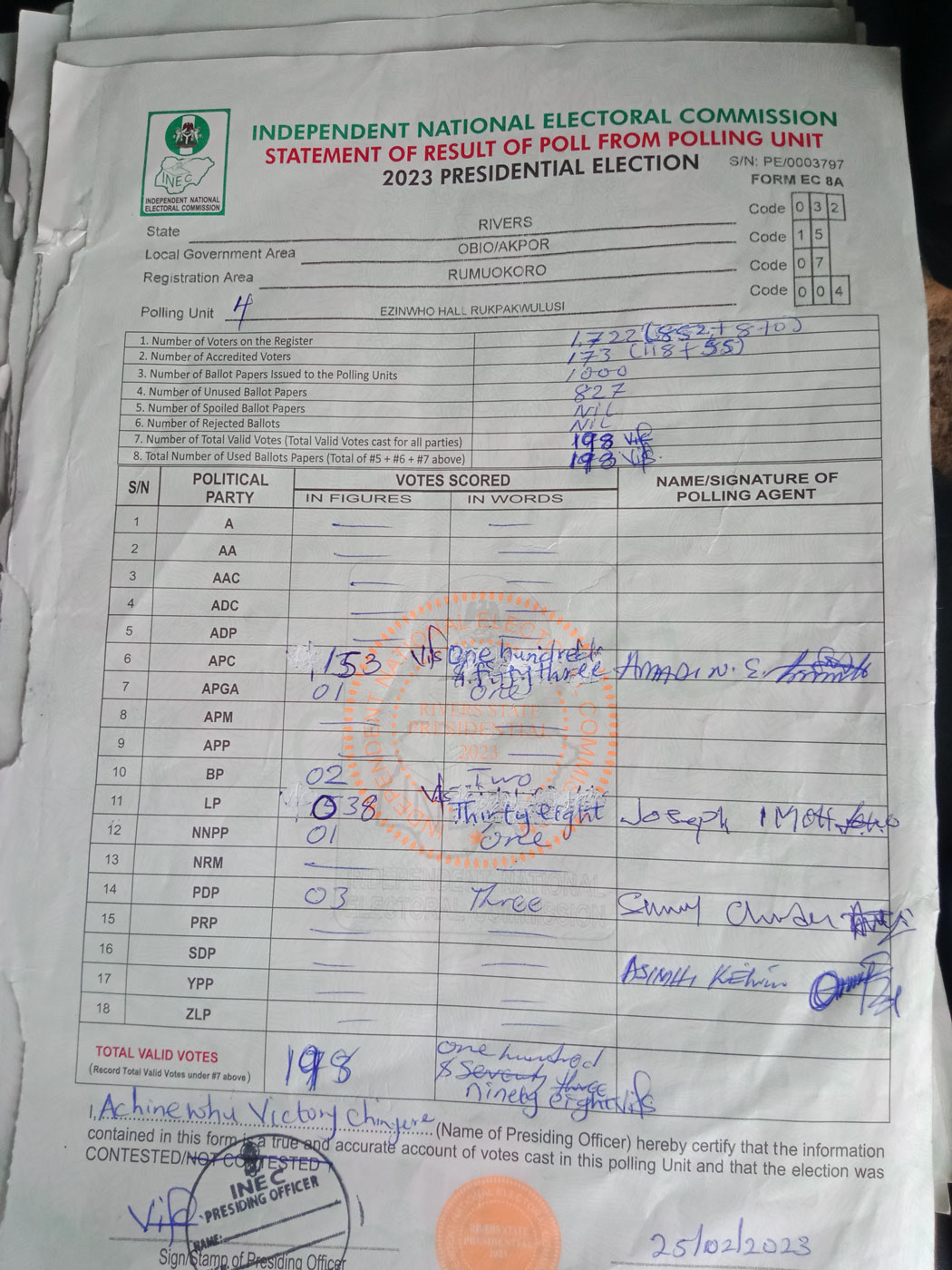
The number of ballots issued to the location is 1,000. The number of unused ballots is 827. There are no spoiled or rejected ballots.
That means 173 votes were cast – in fact, when using words, that is the number first written down for the total. But those words are then crossed out. The digits for the total are also overwritten. The new number for votes cast now exceeds the number of accredited voters for the polling location.
Typing erasing fluid like tippex or white-out is used to change the votes to particular parties. Once again, LP goes down, this time from 53 to 38 votes. A darker pen used elsewhere on the document is used to lower the total.
It is difficult to determine what happens to the APC total. It is unclear what was first written down before tippex and overwriting. A number three is overwritten with a five, for instance. The end result is that APC is reported as winning the neighbourhood with 153 votes.
In Asari-Toru, east of the metropolis of Port Harcourt, similarly altered filings were submitted for the polling unit at council hall, Dappa Polo II.
The number of valid ballots was increased to 950.
The vote totals for APC soared from 14 to 818 votes, moving the party from third place to first, far surpassing the 48 votes for LP.
These kinds of changed documents came in from other parts of Nigeria, including Kogi, Kwara, Plateau and Kano states.
At a polling station at the Government Junior Arabic Secondary School in the Minjibir LGA, Kano state, the tally for the New Nigeria Peoples Party (NNPP) appeared to escalate from 65 to 98 votes.
APC went up from 11 to 28 votes. PDP went down from 13 to three votes.
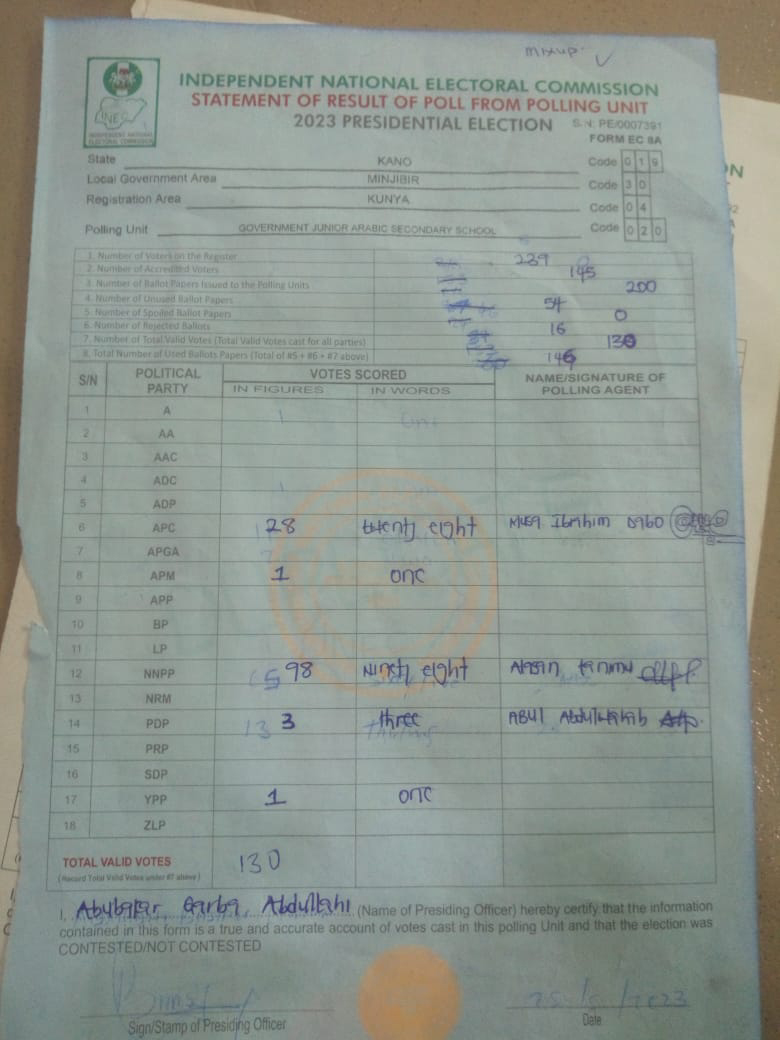
“From all intents and purposes, the alteration of Form E8 (the official INEC voting tally document) from polling units raises a serious question about the transparency and credibility of the elections,” said Mgbeahuruike from CDD. He said INEC should take “immediate action” and examine the documents and determine the effect these altered documents had on voting results.
Should the alterations be found to be “deliberately orchestrated,” he said, “it could indicate an attempt to manipulate the election results and undermine the trust in the electoral outcome, which have far-reaching implications for the country’s democracy.”
DOCUMENTS LACKING NEEDED SIGNATURES
CCIJ also identified almost 4,000 tallies submitted across the country without signatures from poll supervisors — a requirement to ensure the validity of the filings. About 13,000 were submitted without proper stamps required to certify results, in apparent violation of Nigerian law. Of these, about 1,700 lacked both signatures and stamps.
That included documents like this from Gombe state, where a polling officer’s signature is missing.
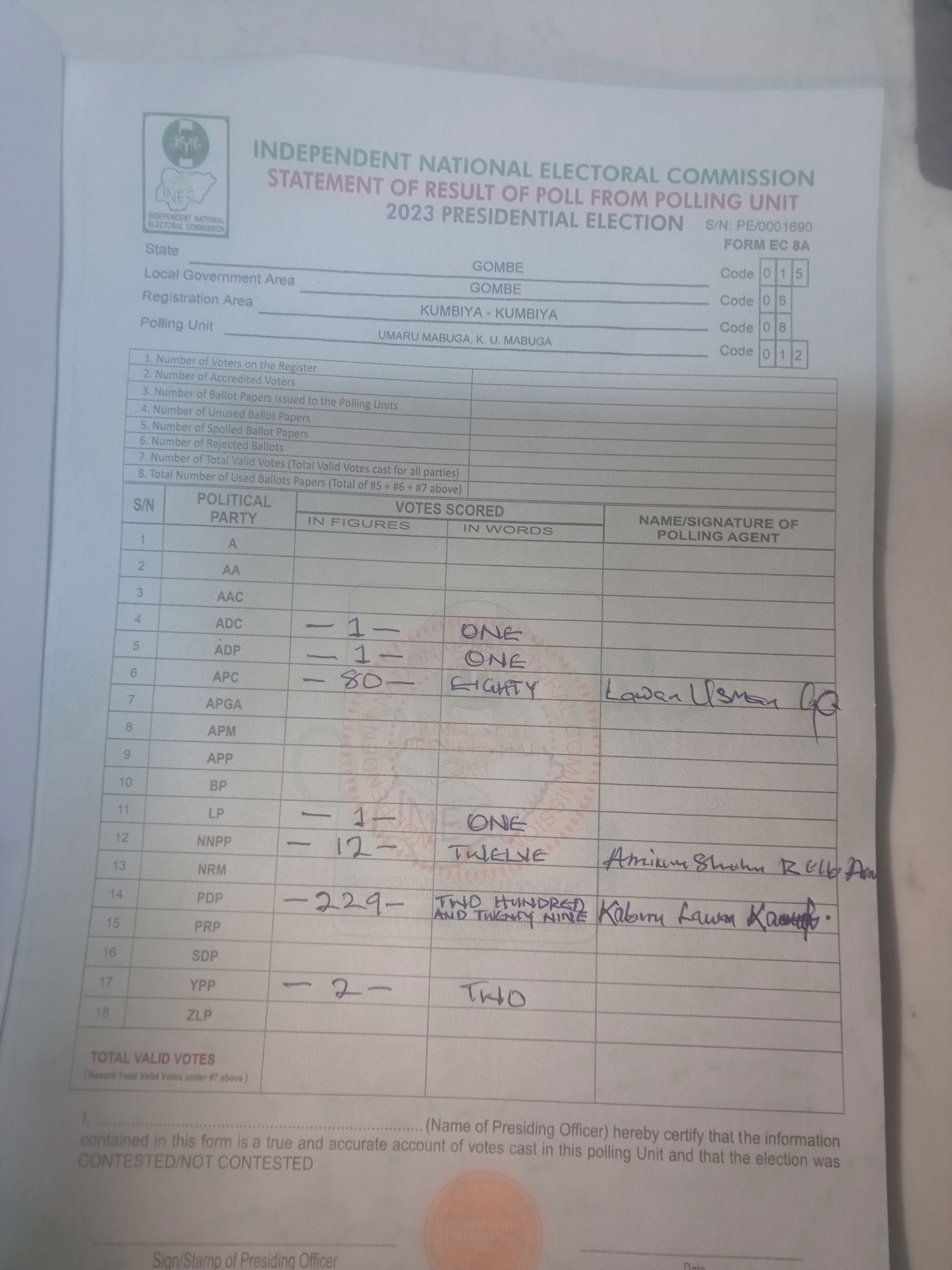
Mgbeahuruike from CDD said the organisation “is particularly worried about the large number of shoddily submitted Form E8.”
“If the documents submitted are questionable, it may well suggest there was a motive to manipulate the election results, which can potentially affect the credibility of the electoral process and outcome,” he said in a written reply to questions from CCIJ.

DOCUMENTS MISSING REQUIRED CERTIFICATION STAMPS
In addition to being signed by presiding officers, voting results are also supposed to be certified with stamps over the signatures. This is to help ensure that the signatures are authentic.
Stamped documents done properly may look like this, with a stamp by the presiding polling officer at the bottom.

But in Lagos, in Alimosho LGA, at least one polling unit submitted its results without an official stamp.

A local INEC official declined to answer questions about this unstamped document and referred questions to the commission’s headquarters, which did not respond to repeated inquiries.
In Gombe state, Kwairanga Yunusa, an assistant polling officer at Garkoyel, Kumo east, said one factor that contributed to these problems was a lack of training workers on proper procedures.
“I have seen some POs (polling officers) who could not write results in either words or figures. Worst still, most of the agents the political parties recruited are not competent and are illiterate,” he said.
In Kano state, in the Fagge LGA, Sani Magaji, a supervisory presiding officer for voting, said he was deeply troubled by unstamped voting result documents.
“I have observed certain irregularities which have given me some sleepless nights,” he said.
“There are issues of unstamped result sheets which should have been validated by the electoral officers, but they were not,” according to Magaji. “Also, if you can recall, there were reports of missing results from the Integrated Voter Register (INEC’s computer system) in most of the local governments here in Kano. I don’t know why these issues occurred, but I know that is not the standard.”
“All these were a serious breach of protocol and the electoral guidelines,” he said. “And that was why they have contributed to the questions raised about the credibility of this 2023 election.”
CDD’s Mgbeahuruike said, “Skipping proper stamping on Form E8 (the voting tally sheet) will immediately suggest a deliberate breach of the provisions of the Electoral Act, which can also compromise the integrity of the process.”
“The sheer number of Form E8s affected indicates that the incident was almost prevalent and cannot be regarded as isolated incidents or human error,” he said. “Overall, the outcome of the process will likely be questionable, devoid of transparency and eroded trust.”
BLURRED DOCUMENTS
Even when election result sheets were filled out properly, technical issues prevented polling unit documents from being uploaded properly into INEC’s computer system.
In Gombe state, Aminu Abubakar, an assistant presiding officer at the Tera polling station in Kumo east, recalled struggling to take an image of Form EC8A, used for counting votes.
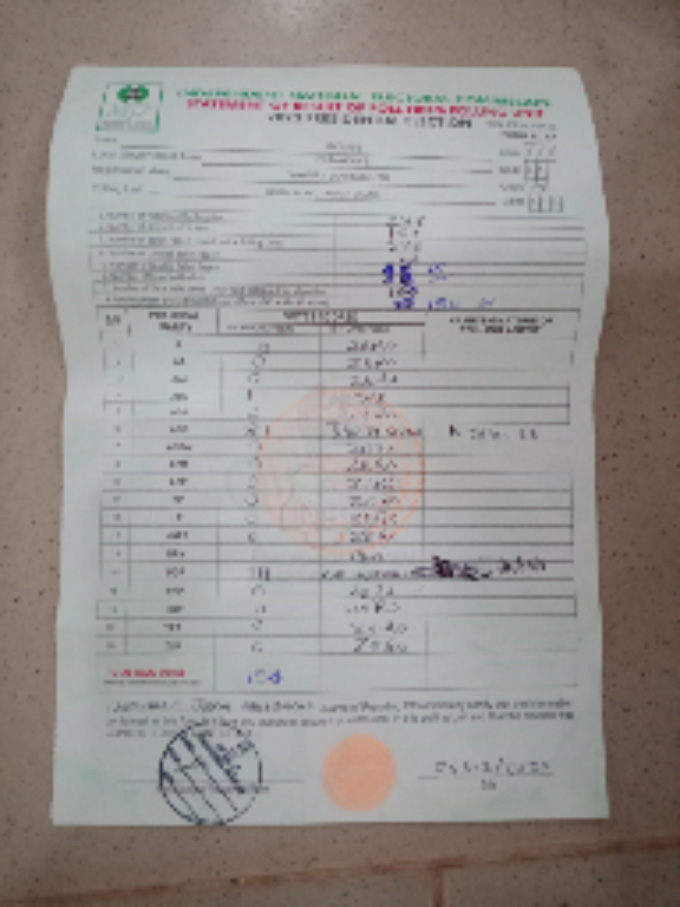
He was trying to use the BVAS machine, a hand-held Chinese-made computer that was supposed to improve voting and ensure greater transparency.
Abubakar recalled trying to take an image of a filled-out form with vote counts.
The light was poor, the computer screen flickered. He said he knew the images would come out blurred – rendering the documents unreadable.
His experience was far from rare.
In Gombe, about 2,300 results uploaded to INEC were blurred – roughly 77 percent of all tally sheets uploaded for the election.
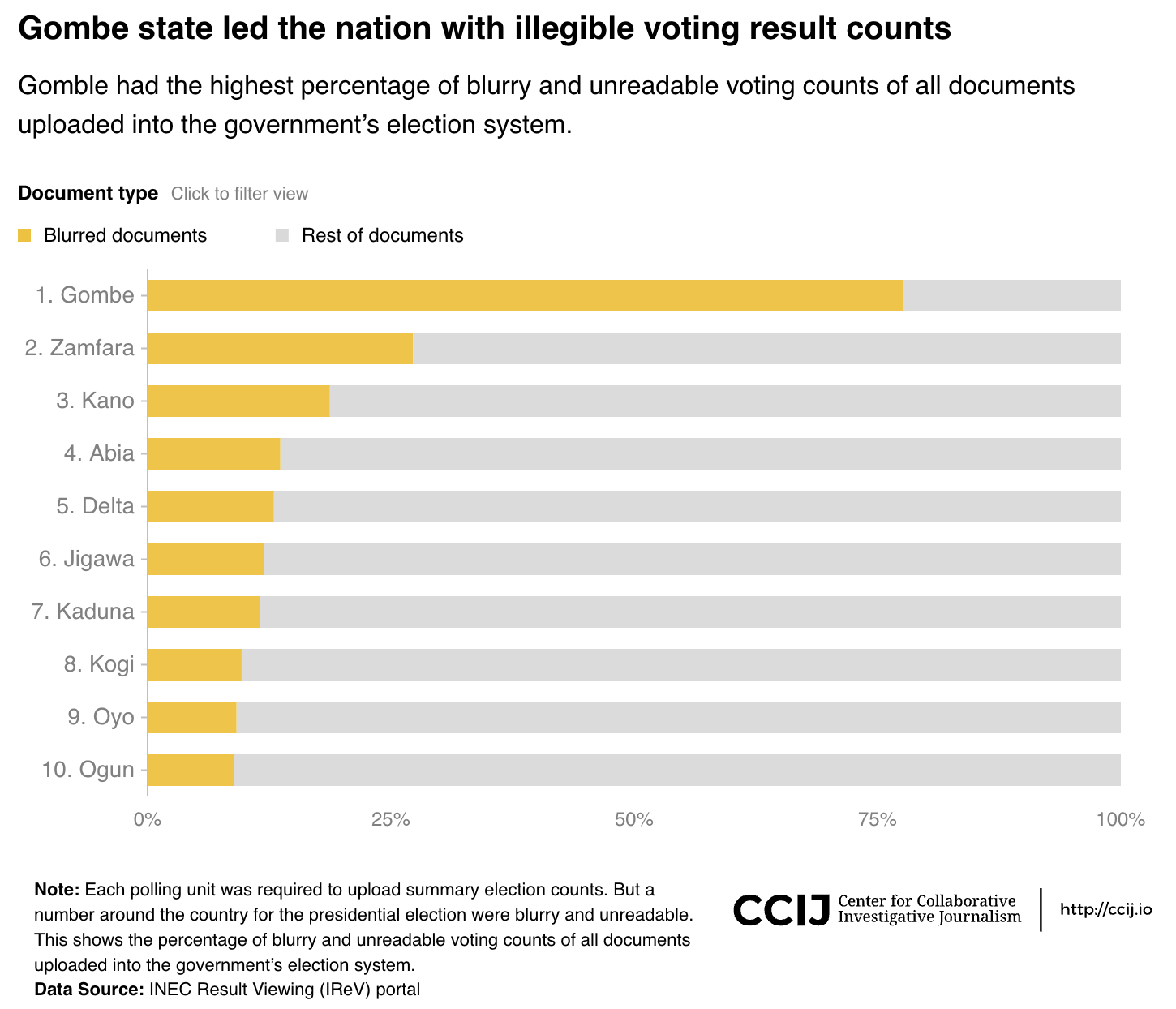
One problem was poor internet connections.
Mohammed Kabir, an assistant polling officer at Jagali south in Gombe state, resorted to using his personal phone’s WiFi so the BVAS machine could work.
“Without my phone, those results wouldn’t have made it,” Kabir said.
Sulaiman Babayo, a presiding officer at the Jimpiti polling unit in Gombe state, said the BVAS’s automated features had unintended consequences. The machine automatically crops images, which sometimes cut off crucial details.
“You don’t always see the entire sheet once it’s uploaded,” he said.
Along with technical problems, workers were not always well trained to use the BVAS machines.
Ibrahim Ali, the electoral officer for Gombe LGA and chairman of Gombe state LG electoral officers, said the two or three days of preparation for many staff before the election were not sufficient and adequate training should last at least seven days.
“Insufficient time provided for the training of election officials on the proper use and troubleshooting of BVAS which led to operational errors and confusion at some polling units and in some cases even slowed down the process of accreditation and voting” was a problem, according to a report INEC released in February 2024.
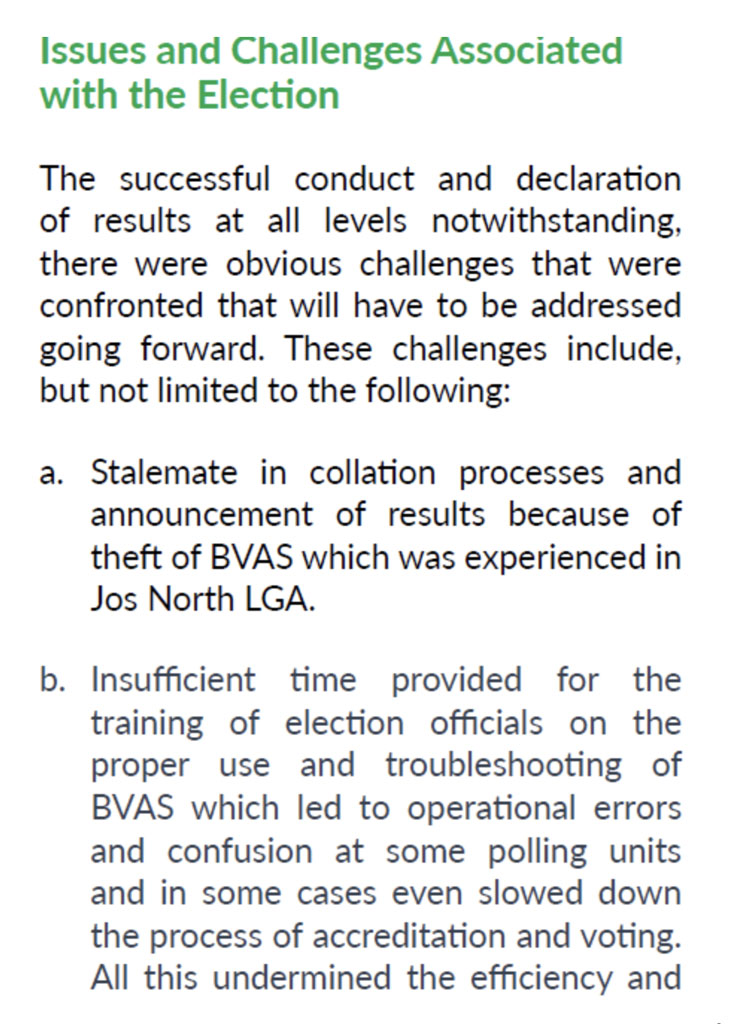
Polling workers told CCIJ about network problems elsewhere in Nigeria causing difficulties for BVAS machines, including in Kano and Kandua states.
Voting did occur at the Kempa polling site in Kaduna state, according to Adam Haruna, the presiding officer at the location. But because of computer network difficulties, he said results could not be uploaded to INEC. Haruna said he sought help from a supervisor.
“The 2023 elections suffered integrity issues as a result of alleged widespread upload of blurry documents,” according to Mgbeahuruike from CDD. “While the blurry uploads and potential technical issues with the BVAS machines may not be blamed on the technology per se, CDD will see it as another breach of the provisions which could undermine the credibility of the election.”
He said CDD is “genuinely concerned” about the illegible documents. It “raises a lot of questions about the authenticity of the filings and the overall credibility of the election result.”
Voting results from at least 9,000 polling station results were not uploaded, according to INEC. The elections commission has not given a full accounting for why no results were filed by those polling units. In its post-election report from February 2024, INEC said poor internet connections were a factor. It noted in the report that the agency was able afterwards to calculate election results.
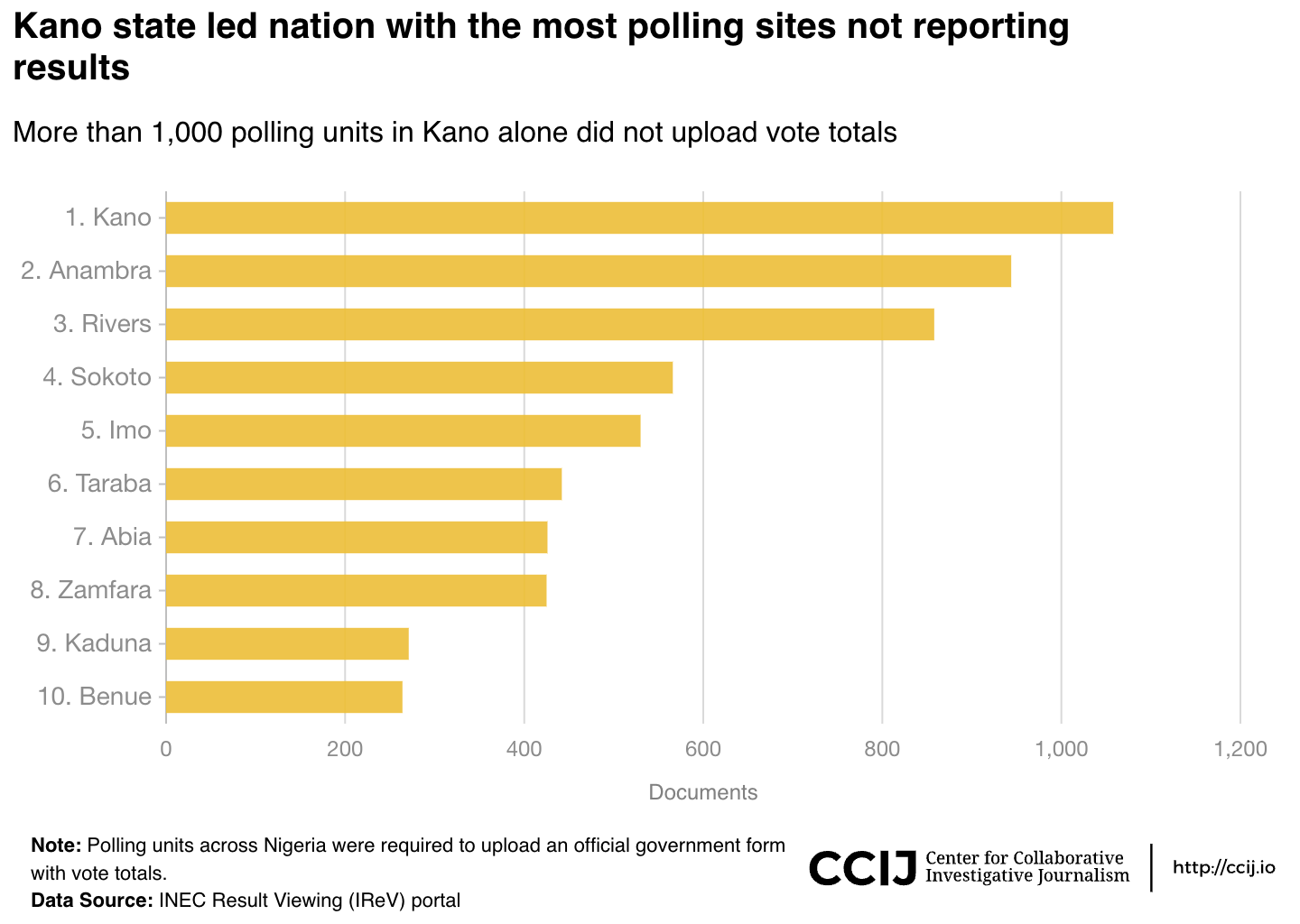
Meanwhile, in the Jos north LGA in Plateau state, BVAS machines were stolen, slowing down the tabulation of votes, according to INEC.
UNACCREDITED VOTERS
The BVAS machine is designed to do more than upload voting results to INEC. It is also supposed to be used to verify each voter’s registration before they are allowed to cast a ballot. The BVAS machine can use a voter’s face or fingerprints to verify that person’s identity.
But INEC polling workers and others told CCIJ that BVAS machines did not always work and voters were allowed to submit ballots without verification.
In Kaduna state, Mahmud Muh’d and Abbah Alhassan, who worked as INEC ad-hoc staff at Unguwan Bayo, Tudun Wada, polling sites, said computer server failures prevented the BVAS machines from verifying the accreditation of voters. Despite the failures, people were allowed to cast ballots.
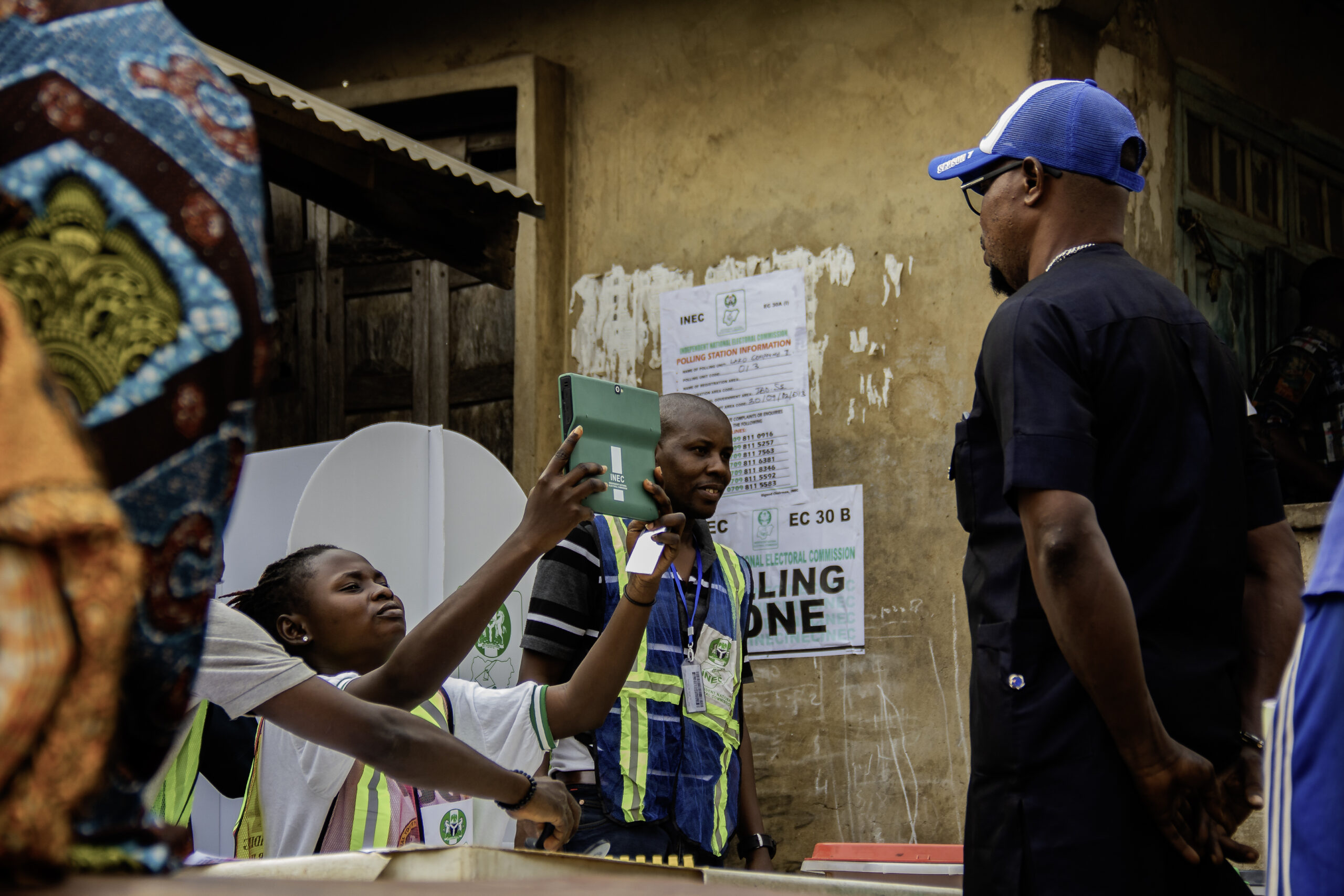
Photograph by Ayo Adams/CCIJ
In Bauchi state, Abdullahi Isa Solo, a former chairman for two political parties, PDP and APC in the wards of Gumai Zaki, said voter verification was manipulated by several political leaders. On the day of presidential voting, he said some party officials had taken the voter identification cards of numerous people and cast their ballots.
“In some cases, they even moved to other polling stations to cast multiple votes, as they had control of many cards,” he said. “I witnessed this practice. I saw individuals voting multiple times, and when I confronted one of them, it caused tension. To prevent any outbreak of violence, however, we chose to remain silent about it.”
“The results they reported,” he said, “don’t reflect the actual reality of the election, as there was no proper accreditation.”
VOTING ABORTED AT SOME SITES – BUT BALLOTS STILL TURNED IN
In Imo and other parts of Nigeria, polling workers and party officials told CCIJ of instances when no actual voting occurred because election officials did not show up. Yet INEC records show voting tallies for those polling stations were submitted for official counts.
In the weeks leading up to the 2023 election, residents in Imo state – including the Oru-east LGA – witnessed violence. Residents there told CCIJ that threats of attacks led many people to stay inside and not risk assault by going to vote. They said no voting happened in their communities.
The residents asked not to be named for this story because they feared being attacked for speaking out.
Despite their accounts that no voting happened, polling result sheets were turned in to INEC.
A CCIJ analysis of tally sheets identified results from six different Oru-East voting sites show unusual patterns.
The patterns suggest that all six – despite being in different parts of the community – were filled out by the same person.

Despite being from six different polling stations, the sections with voting result figures all appear to bear the same handwriting.
The twos have similar small curves on the bottom.
When recording no votes, they all have the same slightly diagonal dashes that rise up.
When writing out the numbers as words, the letters appear to be in the same hand.
There are more similarities. The three parties that got votes finished in the same order, with APC winning followed by LP and PDP. No other party got votes.
One other detail is striking: The numbers on all six tally sheets end in a 0, 2 or 5 – no other number.
For instance, APC on the six sheets won with 45, 90, 50, 90, 55 and 95 votes.
But the odds that 24 different numbers all ending with a 0, 2 or 5 is very slim – more than 1 in a billion. A person would have a far greater chance of getting hit by lightning.
Despite the similarities that suggest the tally sheets from six different polling units were written in the same hand, Emmanuella Ben-Opara, head of INEC’s department of voter education and publicity, said elections were held at those locations and results were properly uploaded to the agency’s computer system.
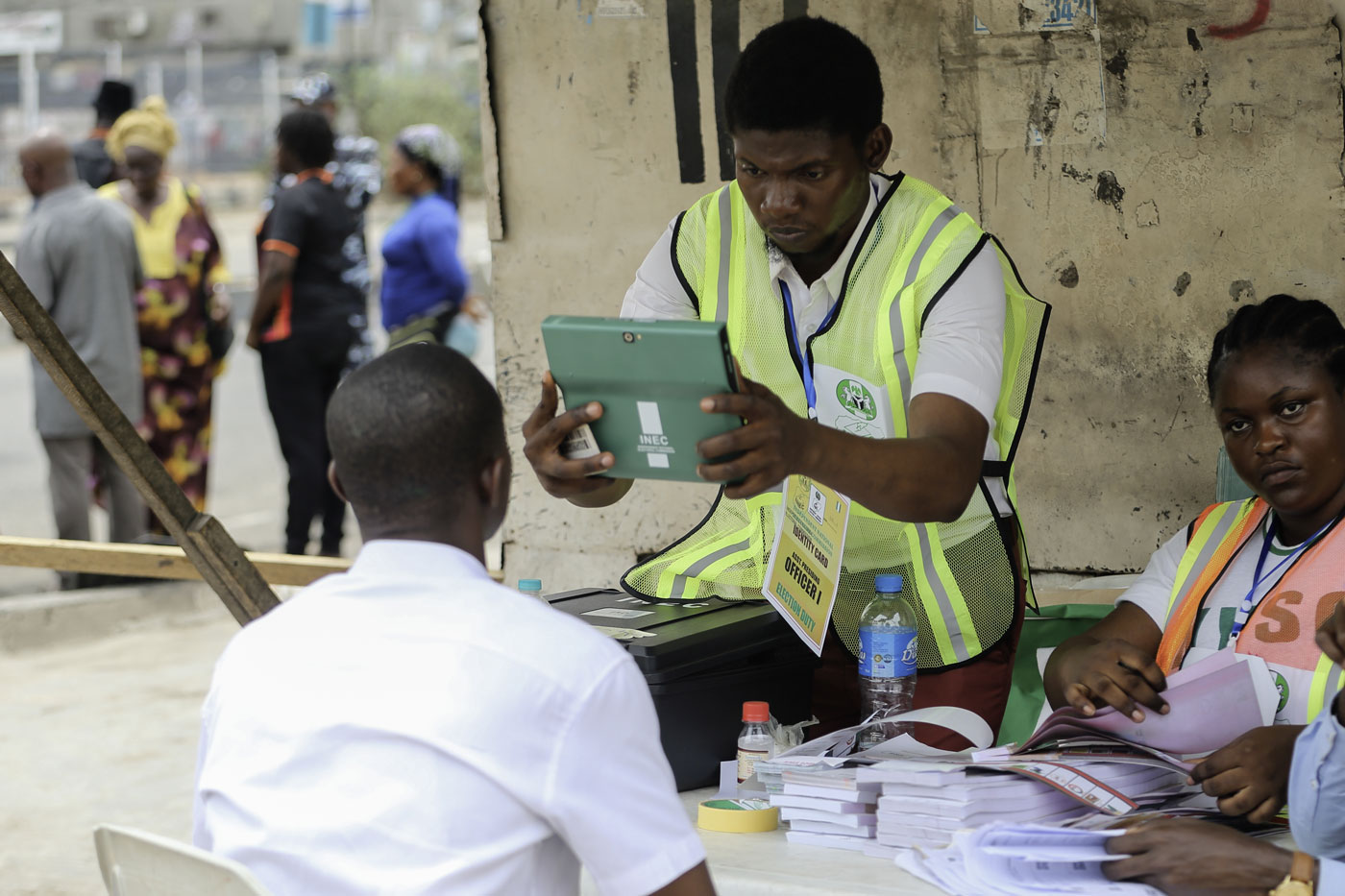
Photograph by Akintunde Akinleye/CCIJ
She discounted the claims of residents interviewed by CCIJ.
“You may not know whether you are talking to somebody who has emotions for the loser of the election,” Ben-Opara said.
“If police deployed to the unit did not write a petition, or report that it did not hold (an election), and we had corps members deployed there who came back with a result and civil society organizations who monitored and never said that elections were not conducted – they were conducted,” she said.
“We had ward collation officers who collated results and then, at the end of the day, we had a state collation officer, the professor that collated results and at each stage, nobody claimed that there was no election,” she said. “Why would I accept that there was no election (at those sites)?”
Meanwhile, in Plateau state’s Bassa LGA, at the Kakeek ward’s Dutsen Kura polling unit, Ageh Ugilli, an assistant community youth leader who also worked on behalf of the PDP, said security workers and other voting officials were overwhelmed by the crowd during the presidential election.
“The crowd was out of control, and everyone wanted to vote no matter what,” he said. “Some people skipped the accreditation line and went straight to the voting line. Because of this, many voters in my ward were not accredited.”
He recalled that INEC officials did not check whether voters were properly accredited.
“At the end, when we were sorting the ballot papers, we found that many people had voted without being accredited. All the agents from APC, PDP, and LP complained, and they agreed to cancel the result,” he said.
He said party officials filled out required forms to cancel the result. Ayuba Adih, an LP representative, corroborated Ugilli’s account.
A CCIJ reporter showed Ugilli and Adih the tally sheet from the Dutsen Kura polling unit had been uploaded to INEC’s computer system, but the cancellation marks were missing.
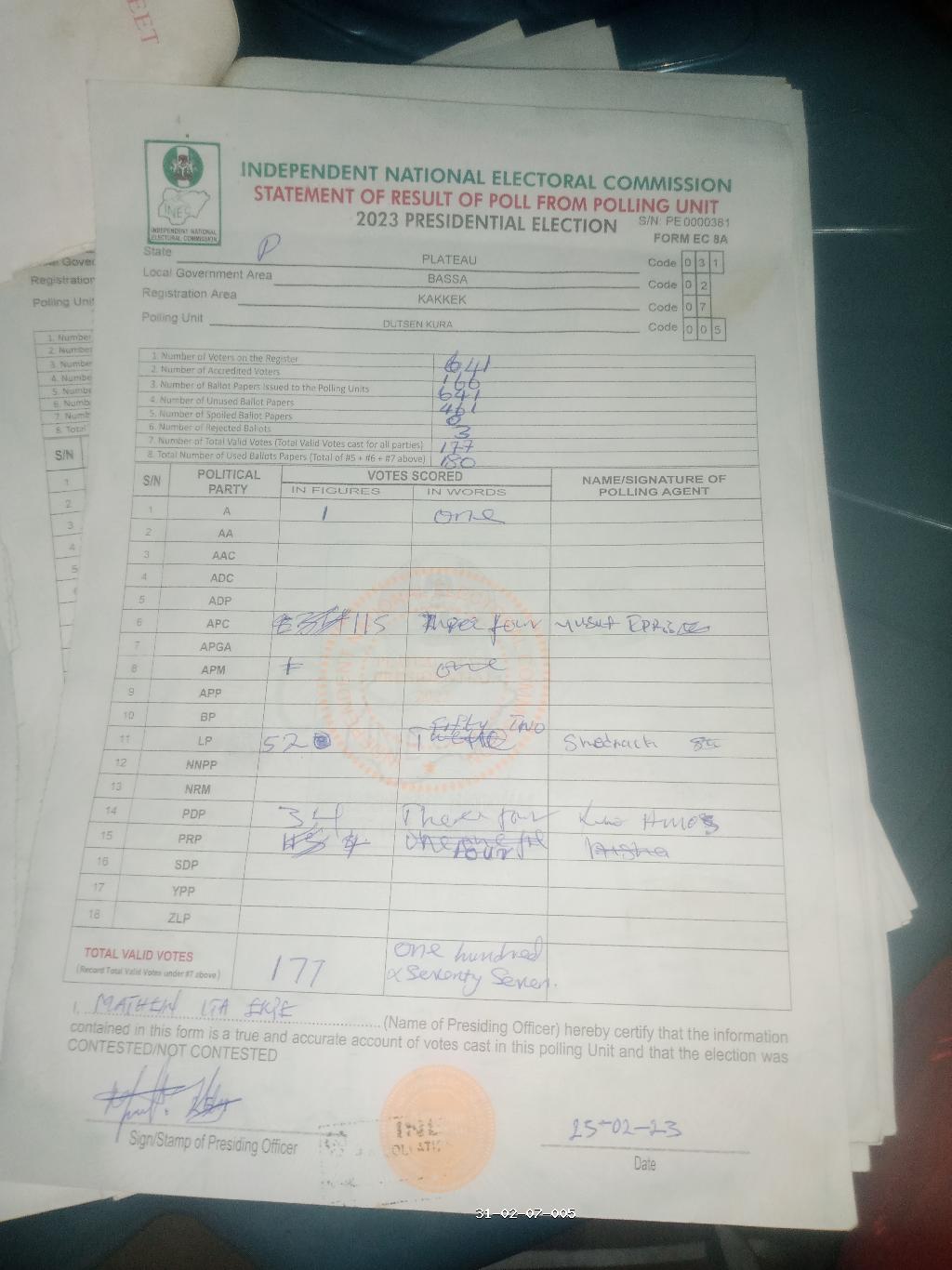
The voting statement sheet for the ward shows there were 166 accredited voters for the location.
Yet more votes than there are accredited voters at the location.
In all – despite only 166 accredited voters there – 177 ballots were accepted there.
INEC officials declined to answer questions about the overvoting there.
This story was produced with the support of MuckRock and the Filecoin Foundation for the Decentralized Web.
Add a comment
